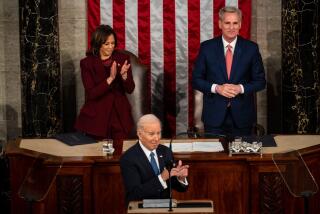Danger in Debt Misery
- Share via
Two years ago U.S. Treasury Secretary James A. Baker III launched an American initiative to deal with the Third World debt crisis. It was an imaginative, constructive plan that called for basic restructuring of the economies of the African, Latin American and Asian nations and a new flow of bank and government credits to restore the growth that many of them had known in prior decades. Many nations responded with the restructuring, but there has been no substantial flow of money. And, worse, many of the poor nations have been made more miserable as their scarce export earnings have been diverted to service the awesome debt burdens, and as their own elites have continued to send their capital abroad.
Clearly, Baker’s work is unfinished. His intentions are now being tested at the annual meeting of the World Bank and the International Monetary Fund. It was at this meeting in Seoul in 1985 that he initiated the Baker Plan.
In Washington, unfortunately, the Third World preoccupation is with Central America. And, in wrestling with the crisis facing the 18 million people of that troubled region, the fragile new democracies of Brazil and Argentina, with 169 million people between them, and the future of Mexico, with another 80 million people, are ignored, along with the rest of the developing nations.
Baker was quick to reject a Brazilian scheme for reducing its $113-billion foreign debt, the largest in the Third World, by converting part of it to fixed-interest bonds. Commercial banks earlier rejected a similar proposal in Argentina. But the Treasury Department was equally quick to say that it had no objection to converting debt into equity as long as it is a voluntarily negotiated scheme. And business-news pages have recently been full of speculation about a successor to Wall Street’s junk bonds that would somehow convert Third World debt into bonds that would be sold for the benefit of Third World debtors and, of course, for the profit of Wall Street. Alas, there is general agreement that a conversion of debts into equity cannot solve much of the accumulated debt.
For those who suggest that the debt crisis really doesn’t matter, there are the Argentine provincial election results to read. The revived strength of the Peronist party was won largely on a campaign challenging President Raul Alfonsin’s economic constraints and responsible handling of Argentina’s $54-billion foreign debt. The successors to Juan Peron show more interest in democracy than Peron did, which is reassuring, but their electoral success, based on renouncing debt repayment and fiscal rectitude, is alarming. There is similar political and economic difficulty in Brazil. Of the three major debtor nations, only Mexico shows economic signs of an ability to meet its obligations while expanding its economy. Only one Latin nation, Colombia, has avoided debt rescheduling.
Major American banks, which hold most of the Latin debt, feel pushed by regulators to write off more of their Third World loans. There are alternatives to that, including concessional interest rates and extended repayment schedules. Interest relief is cited as one of four major policy responses in an article on Latin debt in the autumn issue of Foreign Affairs by Pedro-Pablo Kuczynski, co-chairman of First Boston International and formerly Peru’s minister of energy and mines.
Kuczynski emphasizes another remedy: increased involvement by multilateral development banks. His proposal comes at a critical time--when the United States is seeking a larger role by the World Bank, which was promised increased U.S. support on the eve of the annual meeting, but is holding hostage new capital for the Inter-American Development Bank unless it rewrites its rules to give the United States more power.
There is one encouraging sign. The Venice summit meeting of the seven leading industrial nations in June specifically endorsed lower interest rates and longer repayment periods for the African debtors accepting economic restructuring. There was plenty of piety at the summit about the rest of the Third World debt, including reaffirmation of the principles of the Baker Plan. But in Africa the governments of the rich nations can actually do something, because the African debt is largely owed to governments--not, like the Latin debt, largely owed to commercial banks. The annual World Bank-IMF meeting will be watched with particular concern to see what the seven do.
In the meantime there is the awesome spectacle of impoverished nations actually paying out more money to the rich nations than they are receiving, and the concomitant paralysis of development. In Latin America, for example, the Inter-American Development Bank reported the other day that there is “little or no economic growth, lower standards of living, high open unemployment, depressed levels of investment and shrunken foreign trade.” That is obviously bad for the Latins. But it is also bad for the United States. And dangerous. Far more dangerous than the perceived threat of Marxism in tiny Nicaragua.
More to Read
Sign up for Essential California
The most important California stories and recommendations in your inbox every morning.
You may occasionally receive promotional content from the Los Angeles Times.













